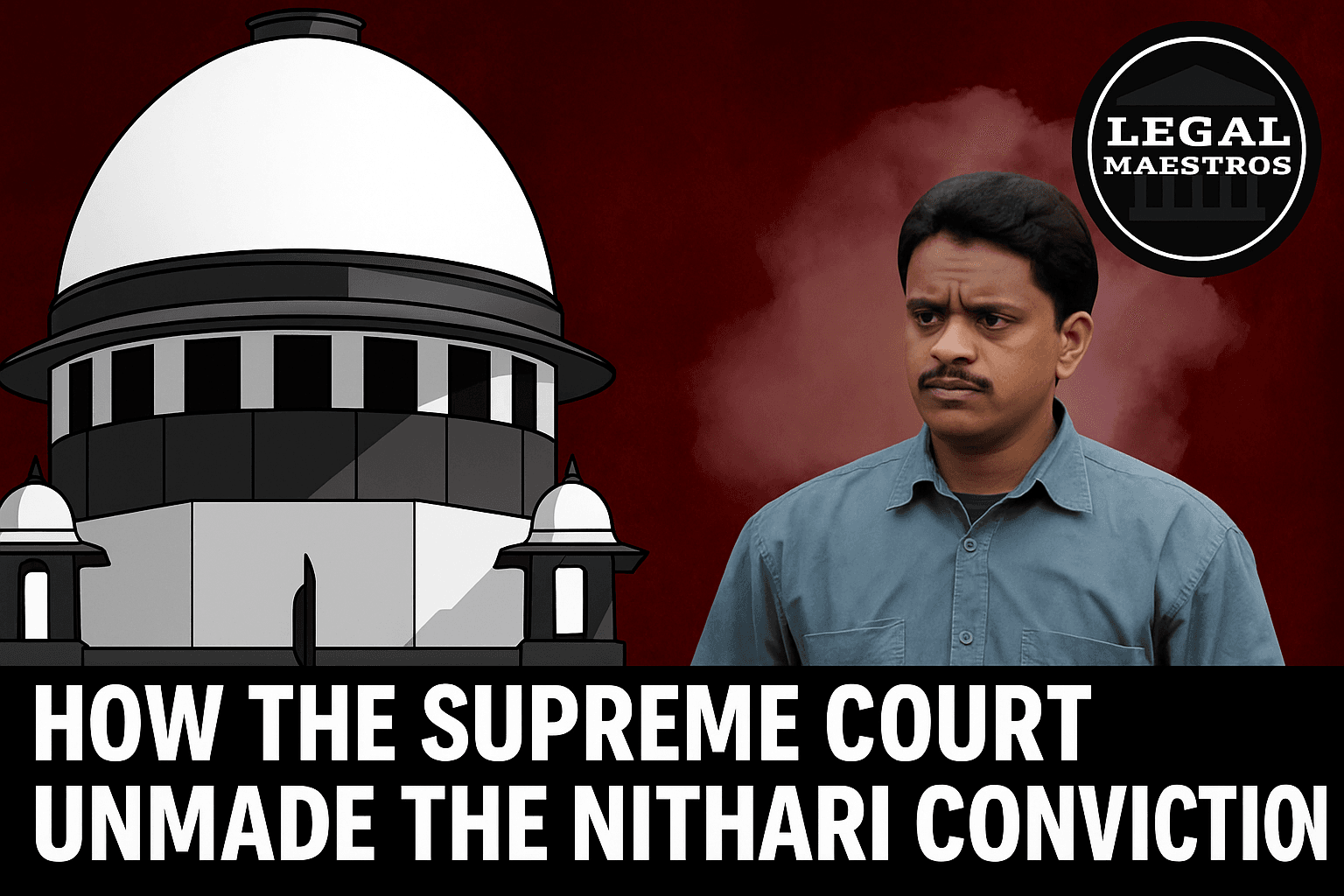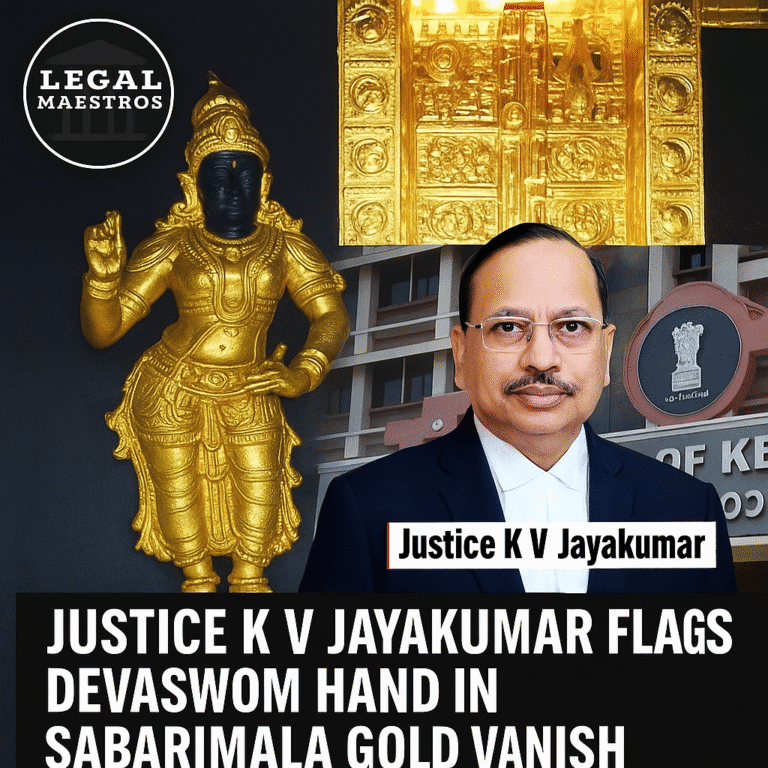
How the Supreme Court unmade the Nithari conviction
An Appeal Petition of a Cure.
Nithari serial killings case that appalled India with its horrors has finally come to an end after almost twenty years of complicated legal wrangling. This was a landmark and highly rare decision by the Supreme Court of India to unmake the final conviction against Surinder Koli. This was done by use of a curative petition, the last form of legal redress in the Indian justice system, which is only utilized as a remedy to an abhorrent miscarriage of justice.
This last verdict, which was rendered in November 2025, was the end and the case involved several death sentences imposed by a trial court. Koli had been found guilty in thirteen different cases on the killings. The court ruling, issued by the Supreme Court, did not re-examine the terrible circumstances of the murder, but simply concentrated on one of the main failures of the legal procedure and the investigation that led to the guilty sentence.
The ruling made by the court revolved around the fundamentals of the Constitution which was the right to life, liberty and equality before the law. The decision succeeded in establishing that the convictions were premised on a base of bad evidence that could not be adequately supported by law. It was an eloquent speech on how a fair trial and an effective investigation should be conducted, no matter how heinous the crime committed.
For any queries or to publish an article or post or advertisement on our platform, do call at +91 6377460764 or email us at contact@legalmaestros.com.
The Failure of the same Evidence.
The ruling of the Supreme Court was grounded on a blatant legal contradiction. Although Koli had already been convicted of thirteen cases, in a damaging verdict in October 2023, the Allahabad High Court had already acquitted him in twelve cases. The High Court had decided that the whole prosecution case was flubbed and the evidence was unacceptable. This brought one conviction to the Supreme Court which had been affirmed many years ago in 2011.
The same case was constructed on this case as the twelve other cases were thrown out, which were constructed on the same set of evidence. The case was mainly based on the confession of Koli and making of skeletal remains that were found in a drain at the back of the house. According to the Supreme Court, it would be a gross miscarriage of justice to allow one conviction to survive when all the other cases based on the same evidence had been thrown out by the judicial system.
Article 14 of the Constitution, which gives equality before the law was applied in this case by the court. It was believed that the same confession and the same recoveries could not be declared in the twelfth case as legally inadmissible and involuntary and in the thirteenth case as legally admissible. This essential contradiction was the main clue that broke the ultimate conviction.
For any queries or to publish an article or post or advertisement on our platform, do call at +91 6377460764 or email us at contact@legalmaestros.com.
An Incidents Damning Report on the Investigation.
The Supreme Court borrowed the strong argument of the Allahabad High Court which dismantled the whole case of the prosecution. That ruling was a damning criticism of the investigative agencies such as the local police and Central Bureau of Investigation (CBI). By the very fact, the courts concluded that fundamental canons of gathering evidence have been flagrantly broken.
The gist of the case the confession of Surinder Koli was held inadmissible. According to the courts, Koli spent sixty days in the continuous uninterrupted custody of police before this confession was captured, which is obviously against the legal protection. No account was made that he had any substantial communication with an attorney and the confession itself bore indications that it was tutored or that he was tortured into giving the confession. According to Section 24 of Evidence Act, this type of involuntary confession is not legally valid.
More so, the alleged skull, bone and weapon recoveries were also denied. It was demonstrated by the court that the crime scene was not secured and people and the media had known about the findings earlier than they were officially announced as a result of the disclosure made by Koli. This failure rendered the legal chain of evidence dead and therefore the recoveries are inadmissible under Section 27 of Evidence Act.
For any queries or to publish an article or post or advertisement on our platform, do call at +91 6377460764 or email us at contact@legalmaestros.com.
Enforcing Justice When There is Grave Suspicion.
During the last order, the Supreme Court recognized the atrocious character of the offences and the enormous pain to lives of the families of the victims. Nevertheless, it distinguished between serious suspicion and legal evidence quite clearly. According to the bench, criminal law would not allow conviction to be made on conjecture or on a hunch. Suspicion no matter how serious, cannot substitute beyond a reasonable doubt.
The court was extremely disappointed that the long investigation could not prove who was actually the perpetrator but in a manner that could be acceptable in court. It attributed the corrosion of the fact-finding process, to the laxity and procrastination of the investigation. According to the judgment, there were other essential leads on the case, such as the possibility of an organ trade angle, which the agencies were never investigating adequately.






![Research Assistantship @ Sahibnoor Singh Sindhu, [Remote; Stipend of Rs. 7.5k; Dec 2025 & Jan 2026]: Apply by Nov 14, 2025!](https://legalmaestros.com/wp-content/uploads/2025/11/Gemini_Generated_Image_s0k4u6s0k4u6s0k4-768x707.png)
![Karanjawala & Co Hiring Freshers for Legal Counsel [Immediate Joining; Full Time Position in Delhi]: Apply Now!](https://legalmaestros.com/wp-content/uploads/2025/11/Gemini_Generated_Image_52f8mg52f8mg52f8-768x711.png)